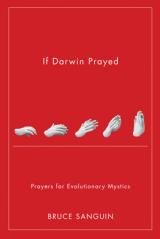"If Darwin Prayed" By Bruce Sanguin
Bruce Sanguin. If Darwin Prayed: Prayers for Evolutionary Mystics. Evans and Sanguin Publishing, 2010. 250 pgs.
This is a prayer book. It follows the Christian calendar, including prayers for each season (i.e. Christmas, Lent, Easter, etc.) and for special occasions (i.e. baptisms, funerals, etc.). Each section begins with a brief introduction and continues with one or more prayers on the subject. However, this is no ordinary prayer book, as the title ought to let you know. It is a prayer book based on what Sanguin calls "evolutionary Christian spirituality." According to the promotional copy these prayers "awaken in us a sacred impulse to evolve in and toward the heart of the divine." According to Sanguin, in his introduction, he is attempting to "incorporate the evolutionary nature of reality into our theology and liturgy."
To integrate science into our spirituality would be a daunting task all on its own. To do so with a specific scientific model in mind even more so and fraught with dangers as well. It has been the conflation of theology and liturgy with science in mistaken and unhelpful ways which has led to the position many within the Christian faith find themselves today; namely, feeling as if science and faith are incompatible (which they are not). As a Christian I believe that all truth is God's truth and all we do should be done to glorify God. However, I also believe that wisdom dictates some aspects of our lives are more difficult to bring together and some lines of thought much harder to walk between. So, to enter this minefield claiming that not only are these two things not incompatible but they can also be conjoined in our spirituality is brave and, perhaps, foolhardy.
Sadly, Sanguin cannot even focus on this task at hand and manages, along the way, to incorporate into his theology a good deal else besides any science of evolution. The hint of this comes in his introduction when he speaks of the 'evolutionary nature of reality.' This is already a great leap forward from just talking about evolution in its scientific form. What this step actually does is allow Sanguin to label any change, transformation, or transfiguration as just another aspect of evolution. When it comes to the biblical revelation, or any other source of 'wisdom' (ranging from Krishna, to Buddha, and more), Sanguin can now claim that these early spiritualists 'intuited' the 'evolutionary nature' of existence and we can see it in this or that aspect of their teaching. That word, 'intuited', became a signal for me by about halfway throughout the book. What it said was: Sanguin is now going to radically reinterpret yet another religious tradition/teaching/event. By the time I finished this book I found myself in the midst of pluralism, relativism, (please note: the following part of my blog, which has been blacked out, is something I have apologized for here. If you wish to view my wrong, you can highlight the text) mystic mumbo-jumbo (I hate to say it like that, but many of these prayers really do cross a broad and fuzzy line between praying and just plain wierdness. And they cross that line by far enough that I can definitively say they are in the land of mumbo-jumbo), and lots of bad theology.
Does Sanguin succeed in his goal? No. Are these prayers I would pray? No. (This last question and answer are something Bruce and I are discussing; it is under review. Again see here) Are they Christian? No.
Conclusion: 1 of 5 stars. Not Recommended. I don't know why you would consider reading this, but whatever reason you thought you had, just forget about it.
This has been a Speak Easy review. Thanks to them for providing this book. #SpeakEasyDarwinPrayer

Comments
It's not "Christian"? Well, it's not the Jesus died for my sins, and now I have eternal life Christian. But that wasn't Jesus' beliefs either.
I also do not find your short summary of Christianity satisfactory at all; I often complain of just that form of reductionism (here, on this blog, and elsewhere).
However, while the distance between orthodoxy (which I strive for) and fundamentalism (which I reject) is large, it is not so large that I am open to anything or have no standards to which I hold "Christian" belief.
I am sorry you found my review only worth of such a response as you have given. I would very much enjoy having a dialog with you about these things since I have clearly misunderstood you in some way(s).